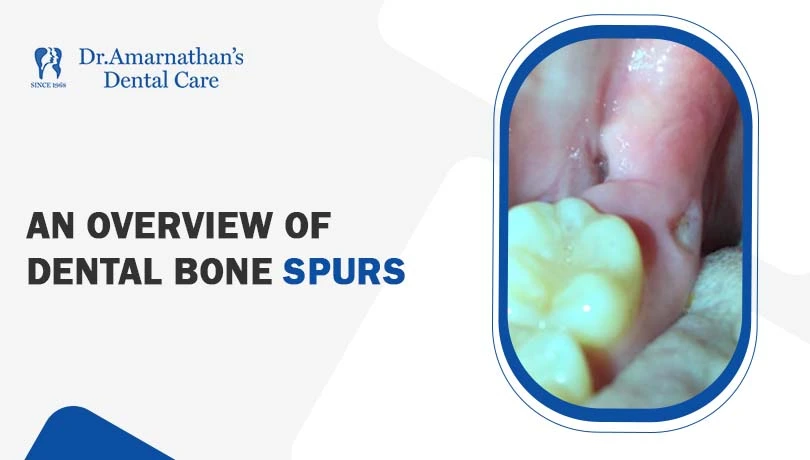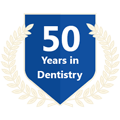
An Overview of Dental Bone Spurs
Dental bone spurs are bony growths on the teeth, gums, or jawbone. They can be unpleasant and uncomfortable, and they can make daily tasks like eating, drinking, and speaking difficult. Fortunately, numerous treatments are available to help manage and lessen the pain caused by dental bone spurs. This article will go through the causes, the side effects, the identification, and the treatments available.
What are Dental bone spurs?
Dental bone spurs, also known as tori, are benign bony growths that can form in the mouth, most commonly on the palate (the roof of the mouth) or the lower jaw (the mandible). They are usually asymptomatic and come in a variety of sizes and shapes.
How to Identify the Dental Spurs?
Tori are frequently identified during normal dental exams or using radiographic imaging. Here are some tips to identify this.
- They are usually identifiable by their location and look.
- They frequently occur on the tongue side of the lower jaw or along the upper jaw’s palate.
- These growths seem like little, spherical bone lumps and might vary in size.
- They feel solid and bony when handled, comparable to the surrounding bones.
Dental bone spurs are normally asymptomatic, but if they cause pain or interfere with oral function, it’s best to see a dentist for a correct diagnosis and treatment options.
What are the reasons for dental bone spurs?
Dental bone spurs can occur for a variety of causes. Some of the elements that may lead to the creation of dental bone spurs are as follows:
- Genetics
- Misalignment of the Bite and Teeth
- Bruxism (teeth grinding or clenching)
- Age
- Trauma
- Oral Habits
- Chronic Irritation
Dental bone spurs may vary in size and position, and not all require therapy. Consult a dentist or oral surgeon for assessment and treatment recommendations if concerns arise.
What are the side effects that can cause from dental bone spurs?
Dental bone spurs are generally considered benign and rarely cause serious issues. However, they may cause some discomfort or minor difficulty. Here are some of the negative effects of dental bone spurs:
Itching and discomfort
It can cause irritation and pain when they brush on the tongue, cheek, or gums. This might lead to painful areas, ulcers, or slight discomfort.
Oral Hygiene Issues
Larger or irregularly shaped bone spurs might make cleaning the region surrounding them difficult. This may result in increased plaque accumulation, gum issues, and cavities.
Problems with Denture Fit
It can interfere with the fit and comfort of dentures and other mouth appliances. This might result in pressure areas, pain, or difficulty wearing the dentures properly.
Difficulty Speaking and Chewing
Depending on their size and position, noticeable dental bone spurs may impair speaking intelligibility and chewing efficiency.
Interference with Dental treatments
Dental bone spurs have the potential to complicate some dental treatments, such as the implantation of dental implants or other oral surgery.
Aesthetics
If the bone spurs are big or apparent, the aesthetics of your lips or grin may suffer.
Rare Cases
While exceedingly rare, there is a chance that it may contribute to the development of oral malignancies. This link, however, is not well-established and requires more investigation.
Dental bone spurs rarely cause major health issues. If you experience adverse effects or have concerns about a dental bone spur, consult a dentist for assessment, suggestions, and management alternatives.
What is the dental treatment for dental spurs
In most situations, it will disappear on their own. If they are creating substantial issues, your dentist may suggest one of the following treatments:
Alveoloplasty
This is a surgical operation that is performed to smooth up the margins of the jawbone where the tooth was taken. This can aid in the prevention of bone spurs.
Removal of a bone spur
To remove the bone spur, a minimally invasive method is used. It is normally done with local anesthetic.
Antibiotics
If the bone spur becomes infected, your dentist may advise you to take antibiotics.
Pain relievers
Over-the-counter pain relievers, such as ibuprofen or acetaminophen, can help to relieve pain and inflammation.
Some Dentists Advice for Dental Bone Spurs
It is critical to follow your dentist’s post-operative care instructions to help avoid the formation of bone spurs. This may include:
- Gently brushing and flossing your teeth.
- Rinse with warm saltwater.
- Refraining from chewing on the affected area
- Taking pain medicines as indicated.
If you have any pain, irritation, or swelling in your gums following a dental surgery, contact your dentist right once. They can examine the problem and advise on the best line of action.
Here are some other prevention methods for oral bone spurs:
- Visit your dentist on a regular basis for checkups and cleanings.
- Maintain good oral hygiene at home
- Eat a balanced diet.
- Do not smoke.
- Take care of any underlying health issues, such as diabetes or osteoporosis.
Conclusion
To summarize,It causes discomfort or difficulty in oral activities due to genetics, habits, biting abnormalities, and age. Fortunately, significant health concerns caused by oral bone spurs are uncommon. If you have dental bone spurs and they are giving you pain or interfering with your oral health, you should seek professional help. A dentist can assess the problem, make appropriate management recommendations, and ensure that your dental health is prioritized. The impact of dental bone spurs can be properly treated in most situations with the right guidance and care, allowing you to keep a healthy and comfortable smile.




